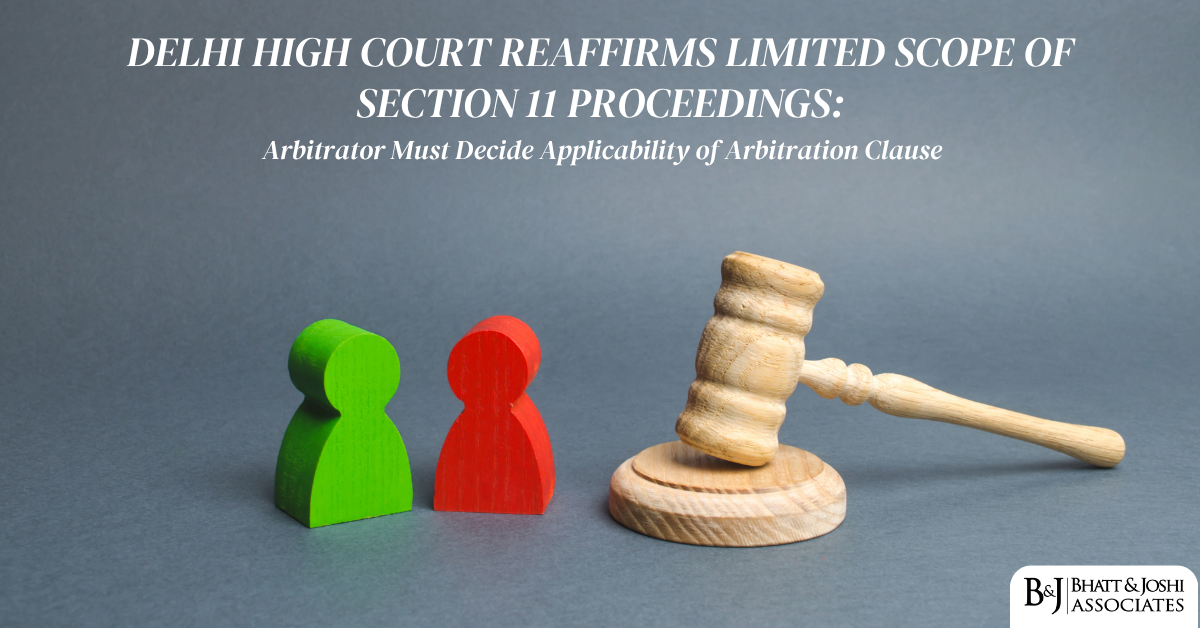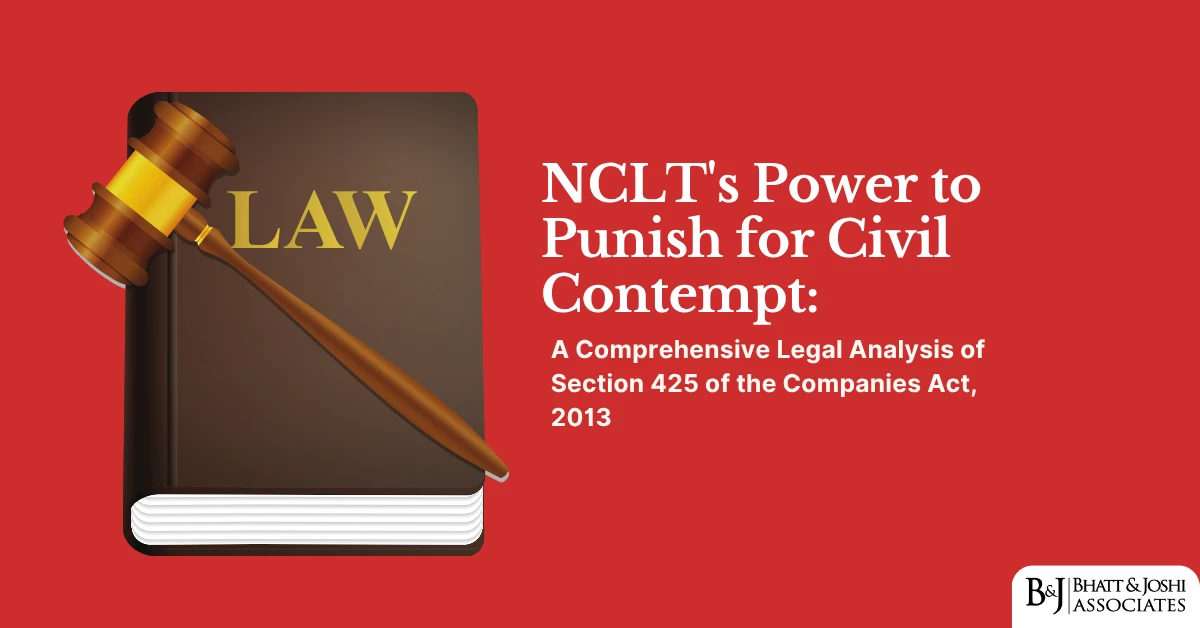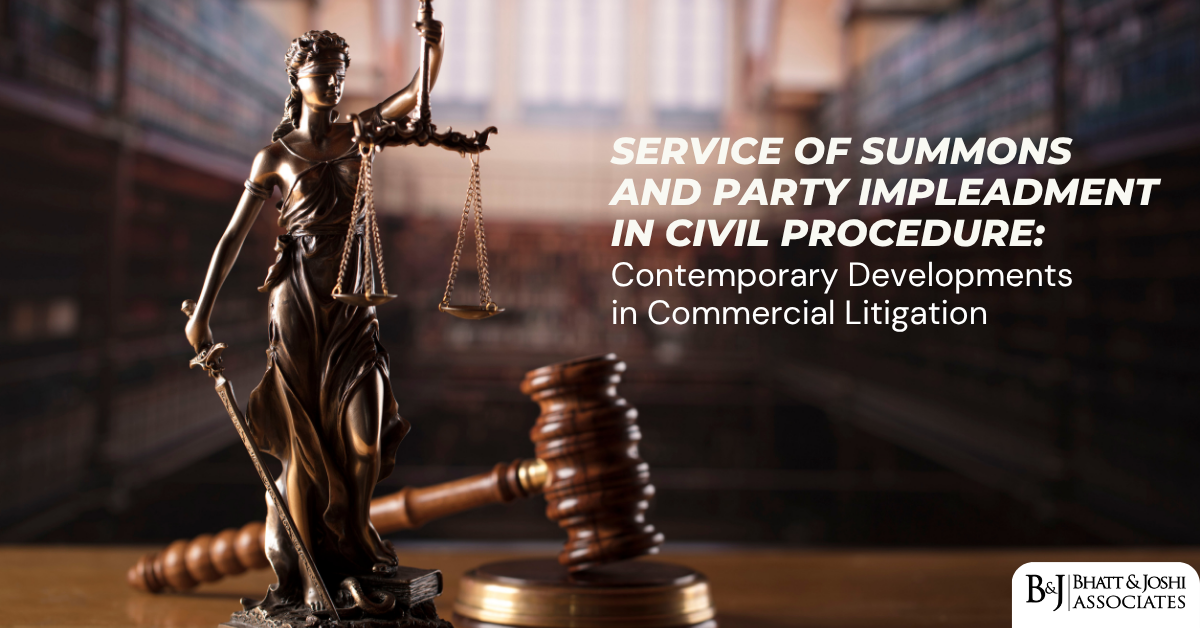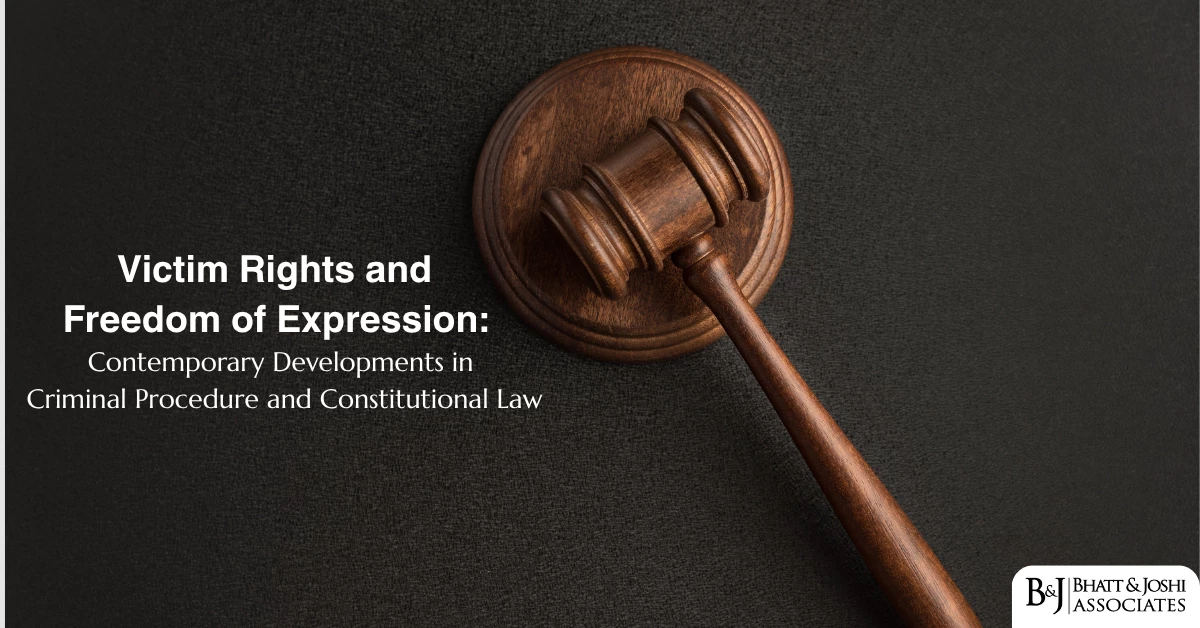Authored by: Aaditya Bhatt, Advocate
Bhatt & Joshi Associates
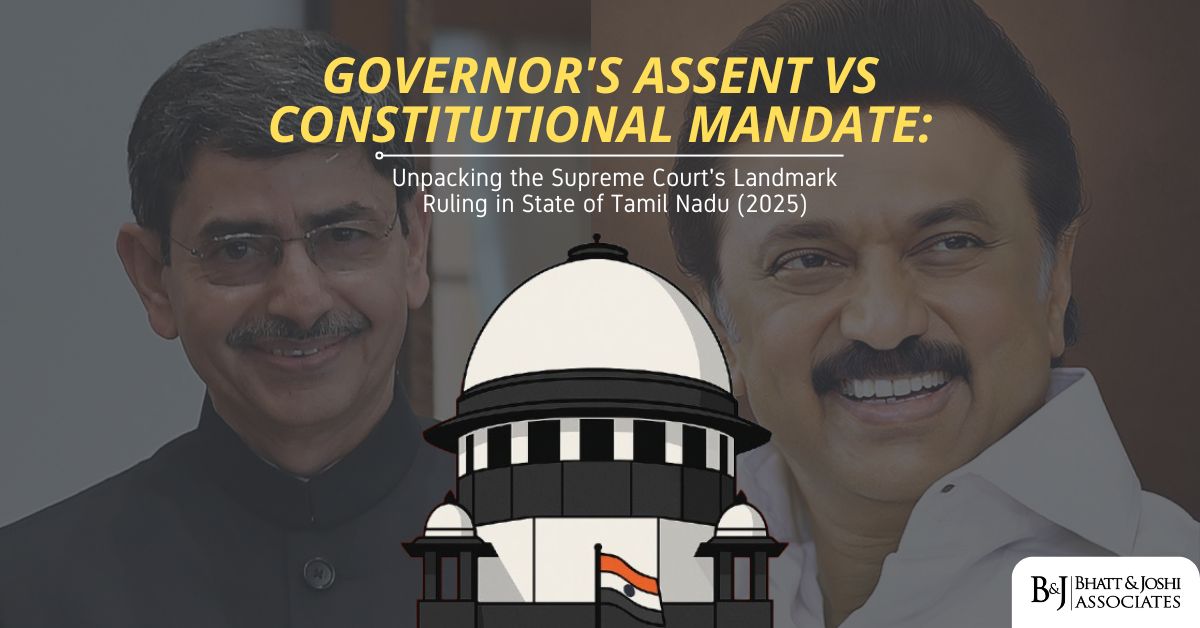
Introduction: A Constitutional Reckoning
The relationship between the Union and the States, particularly the role of the Governor as a constitutional head and a link to the Centre, has been a recurring theme in India’s constitutional discourse. The Supreme Court’s judgment in State of Tamil Nadu vs. Governor of Tamil Nadu & Anr. (Writ Petition (Civil) No. 1239 of 2023, cited as 2025 INSC 481) marks a significant moment in this ongoing dialogue. Delivered on April 8th, 2025, this landmark ruling provides crucial clarifications on the scope and limitations of the Governor’s powers under Article 200 of the Constitution, especially concerning the assent to Bills passed by State Legislatures. Addressing issues of gubernatorial inaction, discretionary powers, and the very essence of parliamentary democracy within India’s federal structure, the judgment sets firm boundaries and reinforces constitutional propriety.
The Factual Crucible: A Governor, Delayed Bills, and Constitutional Questions
The case arose from a writ petition filed by the State of Tamil Nadu under Article 32, highlighting perceived constitutional transgressions by the Governor. The core grievances, as meticulously detailed by the Court (Paras 3-29), included:
- Prolonged Inaction on Bills: Twelve Bills passed by the State Legislature between January 2020 and April 2023 remained pending with the Governor for assent, some for years.
- Action Triggered by Litigation: Only after the Court issued notice in the writ petition did the Governor act on the pending Bills (on November 13, 2023), withholding assent simpliciter (without message) to ten and reserving two for the President. This action came after the Supreme Court’s clarifying judgment in State of Punjab (supra) on the procedure under Article 200.
- Re-passing and Subsequent Reservation: The State Legislature, in a special session (November 18, 2023), reconsidered and repassed the ten Bills without material changes, presenting them again for assent under the first proviso of Article 200. However, the Governor, citing repugnancy (despite acknowledging the bills as intra vires), reserved these repassed Bills for the President’s consideration on November 28, 2023.
- Other Delays: The petition also cited delays concerning sanctions for prosecution, premature release of prisoners, and TNPSC appointments.
This factual matrix set the stage for the Court to delve deep into the constitutional architecture governing the legislative process at the State level.
Key Constitutional Questions on Governor’s Powers under Article 200
The Supreme Court identified several “questions of paramount constitutional importance” for determination (Para 36, elaborated in Paras 61-66):
- What are the precise courses of action available to the Governor under Article 200?
- Is the first proviso an independent option, or is it tied to withholding assent? How should the phrase “Bill falls through unless…” be construed?
- Is the State of Punjab (supra) decision per incuriam?
- Does Article 200 permit ‘absolute’ or ‘pocket’ vetoes?
- Can the Governor reserve a bill for the President after it has been repassed under the first proviso? Was the Governor’s reservation of the ten repassed bills lawful?
- Is there an express or implied time-limit within which the Governor must act under Article 200? How should “as soon as possible” be interpreted?
- Must the Governor act only on the ‘aid and advice’ of the Council of Ministers under Article 200, or does discretion exist? What is the source and scope of such discretion? Does the deletion of “in his discretion” from the draft Article matter?
- Is the Governor’s exercise of functions/discretion under Article 200 subject to judicial review? What are the parameters? Is the President’s action under Article 201 similarly reviewable?
- Are the observations in Hoechst, Kaiser-I-Hind, and B.K. Pavitra regarding non-justiciability applicable?
- How must the President act under Article 201 on a reserved Bill?
Governor’s Powers under Article 200: Supreme Court’s Clarifications
The judgment provides a masterclass in constitutional interpretation, blending textual analysis with historical context and purposive reasoning, particularly in the context of the Governor’s Powers under Article 200.
1. The Governor’s Options and the First Proviso’s Mandate
The Court reaffirmed the three mutually exclusive options under the substantive part of Article 200: Assent, Withhold Assent, or Reserve for President (Para 169). The Court decisively settled the debate around the first proviso:
- Integral Link: It is “intrinsically attached to the option of withholding of assent” and “not an independent fourth course of action” (Paras 191, 196, 434(II)).
- Mandatory Consequence: When the Governor withholds assent, the procedure under the first proviso must follow (Paras 175, 182, 434(II)). The Governor must return the Bill (if not a Money Bill) with a message “as soon as possible.”
- No ‘Simpliciter’ Withholding: The Court found the idea of withholding assent without returning the bill under the proviso to be constitutionally impermissible, amounting to an ‘absolute veto’ which is absent from the scheme (Paras 198, 209, 434(V)). The Court noted:
“Thus, it is only upon the declaration of withholding of assent that the first proviso is animates into action.” (Para 190)
“…it is not open for the Governor to declare a simpliciter withholding of assent without taking recourse to the first proviso as that virtually amounts to the exercise of absolute veto by the Governor, a power which is conspicuously absent from our constitutional scheme.” (Para 209)
- Governor Bound after Repassage: The phrase “shall not withhold assent therefrom” in the proviso creates a clear constitutional prohibition against withholding assent once the Legislature repasses the bill (Paras 170, 201).
2. Rejecting Absolute and Pocket Vetoes
The Court emphatically stated that the Governor possesses neither an absolute nor a pocket veto under Article 200:
“Neither the concept of ‘pocket veto’ nor that of ‘absolute veto’ finds place within the constitutional scheme and mechanism envisaged under Article 200…” (Para 434(V))
The mandatory nature of “shall declare” negates inaction (pocket veto), and the compulsory procedure following withholding of assent negates finality (absolute veto) (Para 197-198).
3. Time is of the Essence: Addressing Gubernatorial Delay
While noting the lack of a prescribed deadline in the text (unlike the initial Draft Article 91’s six weeks, Para 217), the Court stressed that this absence does not license indefinite delay:
- “As soon as possible”: This phrase in the first proviso “infuses a sense of urgency and expediency” (Paras 186, 197).
- Reasonable Time Principle: Where no time limit is fixed, power must be exercised within a reasonable time (Ram Chand, Durga Pada Ghosh cited in Paras 229, 226).
- Constitutional Imperative: Delay “roadblocks the law-making machinery” and undermines representative democracy (Paras 231, 246).
- Judicial Standards Prescribed: To ensure accountability and provide benchmarks for judicial review, the Court prescribed timelines (derived from Sarkaria/Punchhi recommendations and MHA guidelines, see Para 120, 385):
- Withholding/Reserving on Aid & Advice: Forthwith (Max 1 month)
- Withholding against Advice (Return with Message): Max 3 months
- Reserving against Advice: Max 3 months
- Assent upon Reconsideration: Forthwith (Max 1 month)
- “(XIV) Keeping in mind the constitutional significance of Article 200 and the role it plays in the federal polity of the country, the following timelines are being prescribed. Failure to comply with these timelines would make the inaction of the Governors subject to judicial review by the courts…” (Para 434(XIV))
4. Demystifying Gubernatorial Discretion under Article 200
The judgment provides a clear and comprehensive clarification regarding the very limited scope of the Governor’s powers under Article 200, especially in relation to the Governor’s discretionary authority.
- The General Rule: The Governor must act on the aid and advice of the Council of Ministers (Para 318). The deletion of “in his discretion” from the original GoI Act provision was deliberate and significant (Paras 315-316).
- Source of Discretion: Any discretion flows only from Article 163(1) – i.e., where the Constitution expressly requires or necessitates action in discretion (Paras 301, 305, 325).
- Limited Exceptions under Art. 200:
- Second Proviso: Bills endangering the High Court’s position (Express discretion, Samsher Singh cited in Para 295).
- Bills Requiring Presidential Assent: Where the Constitution mandates Presidential assent for validity or immunity (e.g., Arts 31A, 31C, 254(2), 288(2), 360(4)(a)(ii)) – discretion arises by necessary implication (Nabam Rebia cited, Para 319).
- Peril to Democracy: Exceptional situations where ministerial advice is biased, the Council disables itself, or there’s a breakdown of the rule of law, as per M.P. Special Police (Para 300, 319).
- No General Discretion: The Governor cannot reserve bills based on personal dissatisfaction, policy disagreement, or political considerations (Paras 103, 364, 367(a)(iv)).
- Overruling B.K. Pavitra: The Court explicitly declared the observations in B.K. Pavitra (supra) regarding the Governor having discretion in reserving bills (beyond the second proviso) and such discretion being non-justiciable, as per incuriam for failing to consider Samsher Singh, M.P. Special Police, and the legislative history (Paras 305-306, 434(XVI)).
5. Illegality of Reserving Repassed Bills
Applying these principles, the Court found the Governor’s action of reserving the ten repassed bills for the President’s consideration illegal:
- Once the bills were returned (even without a message, which itself was improper post State of Punjab) and repassed by the Legislature without material changes, the only constitutional option was assent (Paras 205, 434(VII)).
- The reservation on November 28, 2023, was in contravention of Article 200 and declared erroneous in law, non-est and set aside (Paras 211, 434(VIII), 435(a)).
- Any subsequent action by the President on these illegally reserved bills was also declared non-est and set aside (Paras 211, 434(VIII), 435(b)).
Judicial Review: The Sentinel on the Qui Vive
The judgment robustly defends the judiciary’s role in reviewing the exercise of constitutional power, including by the Governor and the President:
- No Power Beyond Review: “no exercise of power under the Constitution is beyond the pale of judicial review” (Para 332). Immunity under Article 361 doesn’t bar challenges to the actions (Para 333).
- Review of Discretion: The exercise of discretion under Article 200 is amenable to judicial review to ensure it stays within constitutional bounds (Paras 321, 348, 434(XV)).
- Justiciability vs. Review: The Court distinguished between the power of judicial review (which is implicit) and justiciability (whether manageable standards exist for review). While assent itself (often based on advice) might lack material for review, withholding assent or reserving bills (which require reasons or specific constitutional triggers) are justiciable (Paras 337-339, 358-359, 434(XXI), 434(XXIII)).
- Grounds: Review can examine legality, constitutionality, arbitrariness, mala fides, extraneous considerations, and inaction/delay (Paras 367, 368).
The President’s Role Under Article 201: Considered Action
The Court clarified the distinct procedure under Article 201:
- No Obligation for Assent: The President is not bound to assent even if the State Legislature repasses the bill (Para 373).
- Requirement of Reasons: If withholding assent (especially after invoking the proviso to return the bill), the President must communicate reasons to the State Government (Paras 397, 405).
- Time Limit: A three-month timeline was prescribed for the President’s decision on reserved bills (Para 391, 434(XIX)).
- Judicial Review: Limited review for arbitrariness, mala fides, inaction, but potentially broader review if withholding assent on purely constitutional grounds related to State List matters without referring to the Supreme Court under Article 143 (Paras 363, 366, 368).
Article 142 Invoked: Ensuring Complete Justice
Finding the Governor’s actions (prolonged inaction, improper withholding, illegal reservation) demonstrated a lack of bona fides and violated the Constitution, and given that assent was the only permissible course after repassage, the Court invoked Article 142:
“Having regard to the unduly long period of time for which these Bills were kept pending… and in view of the scant respect shown by the Governor to the decision of this Court in State of Punjab (supra) and other extraneous considerations… we are left with no other option but to exercise our inherent powers under Article 142… for the purpose of declaring these ten Bills as deemed to have been assented on the date when they were presented to the Governor after being reconsidered i.e., on 18.11.2023.” (Para 435(c))
This extraordinary step underscored the Court’s commitment to preventing constitutional deadlocks and ensuring the legislative process is not thwarted by unconstitutional means.
Conclusion: Reinforcing Constitutionalism and Federal Harmony
The Supreme Court’s decision in State of Tamil Nadu vs. Governor of Tamil Nadu is a powerful assertion of constitutional principles over political expediency. It meticulously delineates the Governor’s Powers under Article 200, emphasizing that the Governor is not an autocratic authority but a constitutional functionary, bound by law, the advice of ministers (generally), and the principles of reasonableness and expediency.
By rejecting the notions of absolute and pocket vetoes, mandating procedural compliance following the withholding of assent, setting timelines as benchmarks for judicial review, severely limiting discretion, and affirming the justiciability of gubernatorial actions, the Court has strengthened the pillars of federalism and parliamentary democracy in India. The judgment serves as a clear directive that Governors must act as facilitators of the legislative process, not as impediments, and must perform their role as a “friend, philosopher and guide” (Para 436) with constitutional propriety and deference to the elected will of the people. The overruling of problematic aspects of B.K. Pavitra adds significant clarity.
Ultimately, the Court reminds all constitutional authorities of their duty to uphold the Constitution, urging harmonious cooperation between the Governor and the State Government, keeping the welfare of the people paramount (Para 444), echoing Dr. Ambedkar’s timeless wisdom about the crucial role of those who work the Constitution (Para 439).





